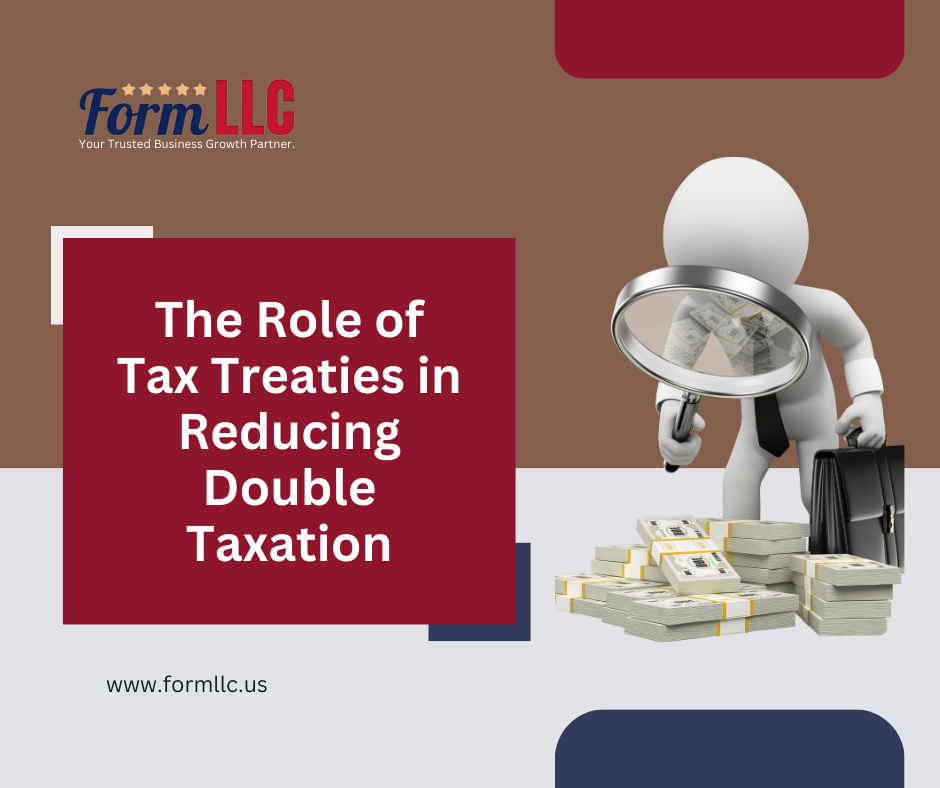

As a non-resident business owner operating a US-based LLC, one of the major concerns you might face is the risk of double taxation—being taxed on the same income by both the United States and your home country. Fortunately, tax treaties between the US and various countries are designed to reduce or eliminate this burden, making cross-border business more manageable and financially viable. Let’s explore the role of tax treaties in reducing double taxation and what you need to know to take advantage of these agreements.
1. What Are Tax Treaties?
Tax treaties are agreements between two countries that outline how taxes are handled for individuals and businesses that operate across borders. The primary goal of these treaties is to prevent double taxation and promote economic cooperation between the countries involved. The United States has tax treaties with over 60 countries, each designed to address the unique tax laws of the participating nations.
These treaties provide guidelines on which country has the right to tax certain types of income, how much tax can be levied, and how tax credits or exemptions can be applied. For non-resident business owners, understanding and leveraging these treaties can significantly reduce your overall tax liability.
2. Avoiding Double Taxation: How Tax Treaties Help
Without tax treaties, income earned in the US could be taxed twice—once in the US and again in your home country. Tax treaties help avoid this by clarifying which country has the primary taxing rights over specific types of income and often allowing for credits or exemptions to offset taxes paid in the other country.
For instance, if you own an LLC in the US and your home country has a tax treaty with the US, you may be eligible for a foreign tax credit. This credit reduces your home country tax liability by the amount of tax you’ve already paid to the US, effectively preventing you from paying taxes twice on the same income.
3. Key Provisions of Tax Treaties for LLC Owners
Tax treaties typically include several important provisions that directly impact foreign-owned LLCs:
- Reduction of Withholding Taxes: Tax treaties often reduce the standard 30% US withholding tax on passive income such as dividends, interest, and royalties. For example, a tax treaty might lower the withholding tax rate on dividends paid to a foreign owner from 30% to 15%, depending on the terms of the treaty.
- Permanent Establishment (PE): Many treaties define what constitutes a permanent establishment in the US. If your business activities do not meet the threshold for a permanent establishment, your income may be exempt from US taxes. Understanding the PE rules in your treaty can help determine whether your income is subject to US tax.
- Exemption of Certain Income Types: Some treaties provide specific exemptions for certain types of income. For example, income from certain services performed outside the US may be exempt from US taxes if specified in the treaty.
- Relief from Double Taxation: Treaties often include a provision that allows you to claim a foreign tax credit or deduction for taxes paid in the other country. This helps to minimize the total tax burden and ensures that you are not taxed twice on the same income.
4. How to Take Advantage of Tax Treaties
To benefit from a tax treaty, you generally need to claim the treaty benefits when filing your taxes. Here’s how you can do it:
- Claiming Reduced Withholding Rates: If you are eligible for reduced withholding rates on dividends, interest, or royalties, you can claim these benefits by submitting IRS Form W-8BEN (for individuals) or Form W-8BEN-E (for entities) to the payer. This form certifies your eligibility for treaty benefits and instructs the payer to withhold tax at the reduced rate.
- Filing the Right Tax Forms: When filing your US tax return, you will need to disclose any treaty benefits you are claiming. If you are a non-resident filing Form 1040-NR, you will detail your treaty-based position in the relevant sections. Failure to properly claim treaty benefits could result in losing out on these valuable tax reductions.
- Understanding Treaty Limitations: Not all income qualifies for treaty benefits, and some treaties have specific limitations or requirements. Always consult the text of the relevant tax treaty and seek guidance from a tax professional to ensure that you are applying the provisions correctly.
5. Common Challenges and Misunderstandings
While tax treaties offer significant advantages, they can also be complex and sometimes misunderstood. Common challenges include:
- Differing Interpretations: The IRS and your home country’s tax authority might interpret treaty provisions differently. It’s important to have documentation and expert advice to support your claims if disputes arise.
- Documentation Requirements: To claim treaty benefits, you often need to provide detailed documentation, such as proof of residency in your home country and evidence of the income being taxed. Maintaining proper records is essential to substantiate your eligibility.
- Treaty Shopping: The IRS is wary of treaty shopping—where businesses or individuals attempt to exploit treaty benefits that they are not genuinely entitled to. Ensuring that your business structure and activities genuinely qualify for treaty relief is key to avoiding legal issues.
6. Seek Professional Guidance
Given the complexities of tax treaties, it is advisable to work with a tax professional who understands international tax law and treaty applications. They can help you navigate the specific provisions of the treaty between the US and your home country, ensuring that you maximize your benefits and comply with all legal requirements.
Conclusion
Tax treaties are a valuable tool for reducing double taxation and easing the tax burden on non-resident LLC owners. By understanding how these treaties work and properly claiming your benefits, you can optimize your tax strategy and avoid being taxed twice on your hard-earned income. For more insights and professional support in navigating tax treaties and managing your US-based LLC, visit my personal website at Tousif Akram or explore our services at Form LLC.